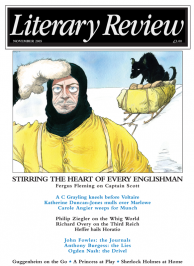Isabel Quigly
Parental Pasts
Statues Without Shadows
By Anna Swan
Sceptre 219pp £14.99
‘You're fit for a prince in disguise,’ Nelly Dean kindly tells the gloomy young Heathcliff, trying to cheer him. ‘And you were kidnapped by wicked sailors and brought to England. Were I in your place, I would frame high notions of my birth; and the thoughts of what I was should give me courage and dignity.’ Emily Brontë got it exactly right: this is how children nearly always face the problems that arise when they lose parents early or have no idea of their background. It is no criticism of Anna Swan's Statues Without Shadows that it follows the pattern suggested by Nelly Dean: the tendency to romanticise, exaggerate, make the most of what is known, find satisfying patterns in the past and try to make order out of what seems haphazard; to find grandeur and glamour in what to others seems ordinary. It is probably the only way to face the truth.
Anna Swan was twenty-eight when she discovered that neither of her parents had died of illness, as she had been told by the grandmother who mostly brought her up, but that, separately and with a gap of about six years between their deaths, they had both committed suicide. Why, how,

Sign Up to our newsletter
Receive free articles, highlights from the archive, news, details of prizes, and much more.@Lit_Review
Follow Literary Review on Twitter
Twitter Feed
Under its longest-serving editor, Graydon Carter, Vanity Fair was that rare thing – a New York society magazine that published serious journalism.
@PeterPeteryork looks at what Carter got right.
Peter York - Deluxe Editions
Peter York: Deluxe Editions - When the Going Was Good: An Editor’s Adventures During the Last Golden Age of Magazines by Graydon Carter
literaryreview.co.uk
Henry James returned to America in 1904 with three objectives: to see his brother William, to deliver a series of lectures on Balzac, and to gather material for a pair of books about modern America.
Peter Rose follows James out west.
Peter Rose - The Restless Analyst
Peter Rose: The Restless Analyst - Henry James Comes Home: Rediscovering America in the Gilded Age by Peter Brooks...
literaryreview.co.uk
Vladimir Putin served his apprenticeship in the KGB toward the end of the Cold War, a period during which Western societies were infiltrated by so-called 'illegals'.
Piers Brendon examines how the culture of Soviet spycraft shaped his thinking.
Piers Brendon - Tinker, Tailor, Sleeper, Troll
Piers Brendon: Tinker, Tailor, Sleeper, Troll - The Illegals: Russia’s Most Audacious Spies and the Plot to Infiltrate the West by Shaun Walker
literaryreview.co.uk